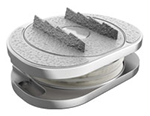Disc replacement surgery is a surgical procedure that involves replacing a damaged intervertebral disc with an artificial disc. This procedure is typically used to treat severe pain and disability caused by degenerated discs in the neck (cervical spine) or lower back (lumbar spine).
Benefits:
- Relieves pain and improves mobility
- Preserves natural spinal movement
- Avoids the stiffness and loss of motion associated with spinal fusion surgery
- May be a better option for younger, healthier patients who have failed conservative treatments such as physical therapy and injections
Procedure:
The surgery is usually performed under general anesthesia. The surgeon makes an incision in the front or side of the spine and removes the damaged disc. An artificial disc is then implanted in its place. The incision is closed, and the patient may require a hospital stay for observation.
Types of Artificial Discs:
Metal-on-metal, Carbon-on-polyethylene, and Composite (metal and plastic).
Recovery:
Recovery time varies depending on the individual patient and the type of artificial disc used. Most patients can return to their normal activities within 6-12 weeks. Physical therapy may be recommended to strengthen the muscles around the spine and improve range of motion.
Risks:
As with any surgery, there are risks associated with disc replacement surgery, including:
Infection, Nerve damage, Adjacent segment degeneration (wear and tear in the discs above and below the replaced disc), and Implant failure.
Eligibility:
Not all patients are eligible for disc replacement surgery. Factors that may disqualify a patient include:
Advanced age, Obesity, Spinal instability, Severe osteoporosis, and Previous spinal surgery.
Conclusion:
Disc replacement surgery can be a viable option for patients with severe pain and disability caused by degenerated discs. However, it is important to weigh the potential benefits and risks carefully before making a decision. It is recommended to consult with a qualified spine surgeon to determine if disc replacement is right for you
